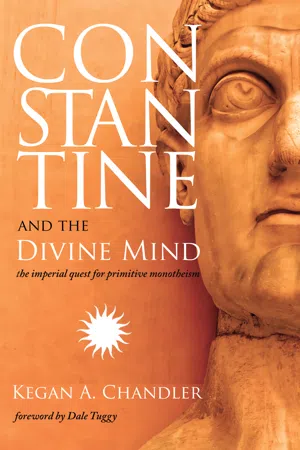![]()
8
Nicaea and Homoousios
For perhaps a decade before the great Council of Nicaea in 325 CE, even as the Donatist controversy raged, a christological crisis had festered in Egypt. Arius, a presbyter from Alexandria, and his bishop Alexander had entertained a public disagreement about the nature of Jesus and his relationship to God. Arius held that the Father and the Son were distinct beings, and that “there was a time when the Son was not.” This contravened with his bishop, and perhaps more importantly with Alexander’s spirited deacon Athanasius, who claimed the Son was “eternally generated.” Arius defended his own unitarian subordinationism as traditional Christian doctrine. But who was right? When Arius said that the Father and Son were separate in essence, was he an innovator or a theological conservative? And what was the relationship between God and his Son Jesus? The controversy soon became a major scandal and caught the attention of Constantine.
The emperor, deeply troubled by the discovery of yet another Christian controversy, sent his advisor, the Christian bishop Hosius of Cordova (d. 359 CE), to investigate. Upon his recommendation, an imperial call was made for a council of bishops to settle the matter.
In this chapter we will consider Constantine’s participation in the Council of Nicaea (325 CE), and his famous connection to the Nicene Creed’s keystone philosophical term homoousios. Understanding Constantine’s involvement will ultimately provide valuable insight into both the evolution of the emperor’s personal theology and his continued belief in the essential harmony of Christian and pagan monotheism.
The Word Homoousios before Nicaea
Special attention in this investigation must be paid to homoousios, the controversial Greek term used in Nicaea’s creed to officially define the relationship between God and the Son of God. Scholars have long debated the origins of the word, but what is widely accepted by historians is Eusebius’s eyewitness report that the term was proposed by none other than Constantine himself. Bernard Lohse summed up the remaining problem of origins this way: “The decisive catchword of the Nicene confession, namely, homoousios (‘of one substance’), comes from no less a person than the emperor himself. To the present day no one has cleared up the problem of where the emperor got the term.”
In his landmark investigation, Christopher Stead catalogued every pre-Nicene occurrence of the word homoousios, revealing the term’s link to Gnosticism. Indeed, modern scholarly consensus on the historical usage of the word is that the first persons to use the term in a theological context were gnostics. There are no pre-gnostic examples of the word, and Pier Franco Beatrice, in his own landmark study, confirmed that the Christian gnostics were in fact the first to introduce the term into the wider Christian world. But what did this term mean to the early gnostics of the late first and early second centuries CE?
In these circles, the term was first used “to describe ‘the relationship between beings compounded of kindred substance’ and was ‘used alongside notions of emanation.’” Stead reveals that in the majority of the earliest cases, “the notion of ‘ousia’ that is implied is either material or conceived in physical terms. It thus means roughly, ‘made of the same . . . kind of stuff.’” Stead continues: “When [homoousios] first appears it is not used to express the Christian theology of the Trinity . . . [it] go[es] back to pre-Christian times.” If this is true, then where did Christian gnostics first learn to use this term?
Beatrice explains that the Christian gnostics had first drawn the word directly from Hermetic sources. The earliest use of the word in extant literature is found in the important Hermetic tractate Poimandres, which dates to the first century CE at the latest. Here the word is used to define the relationship between a monotheistic God—God the Father or “Mind” (νοῦς)—and his emanations. Especially noteworthy is the first of these emanations, the logos, who is cast as a second god and called “the Son of God.” In the text, God the Father says: “I am the Mind (νοῦς), the first God . . . And the brilliant logos that issued forth from the Mind is the Son of God . . . You must understand that what hears and sees inside of you is the logos of the Lord, his Son, but the Mind is God the Father. And they are not divided from each other, because they are united by life.” We then read that “the logos of God . . . was united with the Mind of the Demiurge. For the logos was of one-substance (ὁμοούσιος) with the Mind.” We already detect here in this pagan document the language of Nicaea: God and his Son-Logos are homoousios (con...
